In the realm of pay-per-click (PPC) advertising, targeting the right audience is paramount to maximise the effectiveness and return on investment (ROI) of your campaigns. While selecting relevant keywords to attract potential customers is vital, neglecting negative keywords can lead to wasteful ad spend and poor campaign performance. Negative keywords act as a filter, ensuring that your ads don’t appear in irrelevant searches, ultimately saving you money and improving your ad targeting. In this blog post, we’ll explore the importance of negative keywords and provide you with a comprehensive list of the best negative keywords to include in your campaigns.
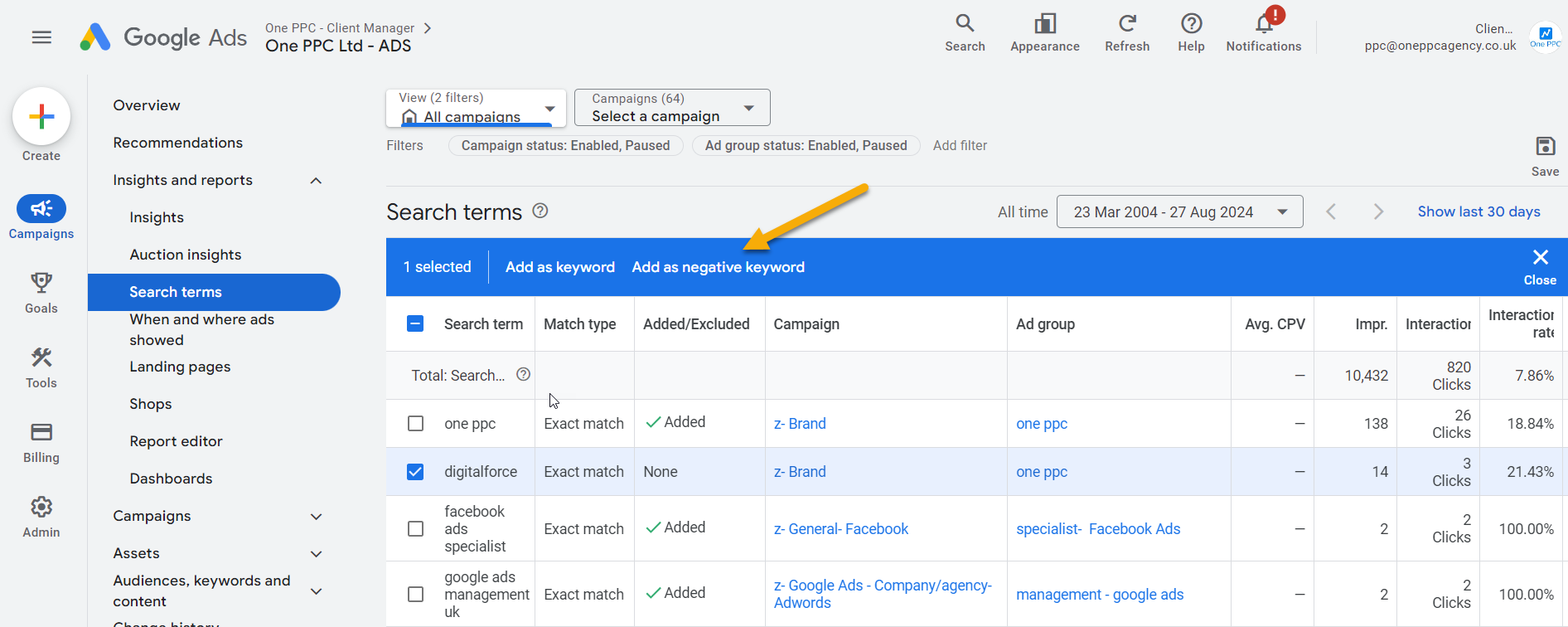
What are Negative Keywords?
Negative keywords are specific terms or phrases that you specify to exclude from triggering your online advertisements. When a user’s search query contains one of these negative keywords, your ads won’t be shown, preventing your budget from being wasted on irrelevant clicks and impressions.
Negative keywords are used in pay-per-click (PPC) advertising platforms, such as Google Ads, Microsoft Advertising, or other similar platforms. By adding negative keywords to your PPC campaigns, you can refine your targeting and ensure that your ads are displayed to the most relevant audience.
The best negative keywords are those that are commonly used across various industries and are not relevant to your own. However, it is important to note that every industry is unique, so it is necessary to review each category and keyword to ensure their complete irrelevance. While these negative keywords are popular, it is essential to assess their applicability for your specific industry. The following list contains over four hundred commonly used negative keywords:
For tips on using negative keywords and how to build negative keyword lists, see our blog post Negative Keyword Guide & Tips.
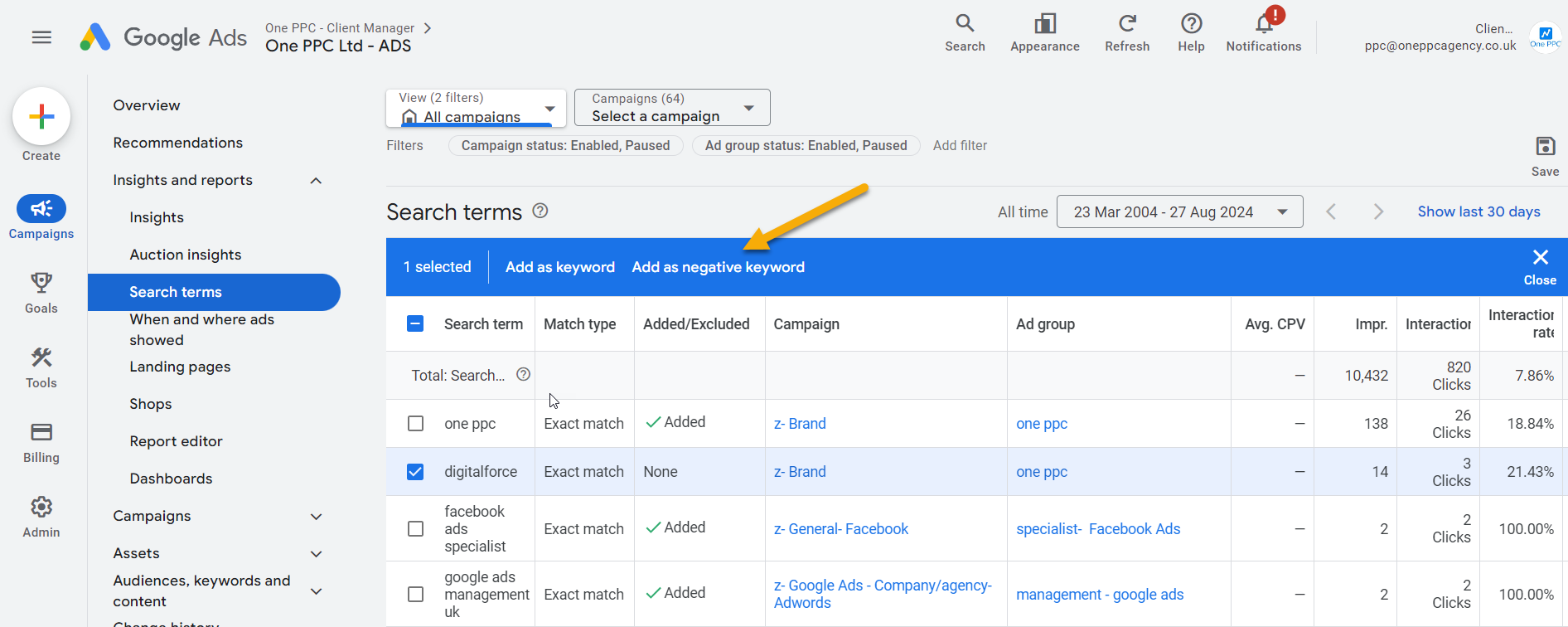
Why use Negative Keywords?
Negative keywords play a vital role in optimising your pay-per-click (PPC) campaigns, helping you save valuable time and money by eliminating irrelevant impressions and clicks. By excluding specific search queries, negative keywords enhance your ad targeting, leading to improved click-through rates (CTR) and higher conversion rates. In this blog post, we will delve into the significance of negative keywords and guide you on leveraging them effectively in your advertising endeavours.
Improving Targeting with Negative Keywords:
The primary purpose of negative keywords is to prevent your ads from appearing in searches that are unrelated to your products, services, or target audience. By specifying negative keywords, you can refine your ad targeting, ensuring that your ads reach the most relevant prospects who are more likely to convert into customers.
Saving Time and Money:
Utilising negative keywords allows you to filter out irrelevant searches, saving you valuable ad spend. By eliminating impressions and clicks from users who are unlikely to engage with your offerings, you optimise your budget allocation, directing it towards more promising opportunities. This ultimately maximises the return on investment (ROI) for your advertising campaigns.
The Role of the Google Ads Search Terms Report:
The Google Ads Search Terms Report is a valuable tool in identifying potential negative keywords. It provides insights into the actual search queries that triggered your ads, allowing you to analyse and exclude terms that do not align with your advertising goals. While using this report is crucial, creating a negative keyword list before launching your campaigns can help you save money from the outset.
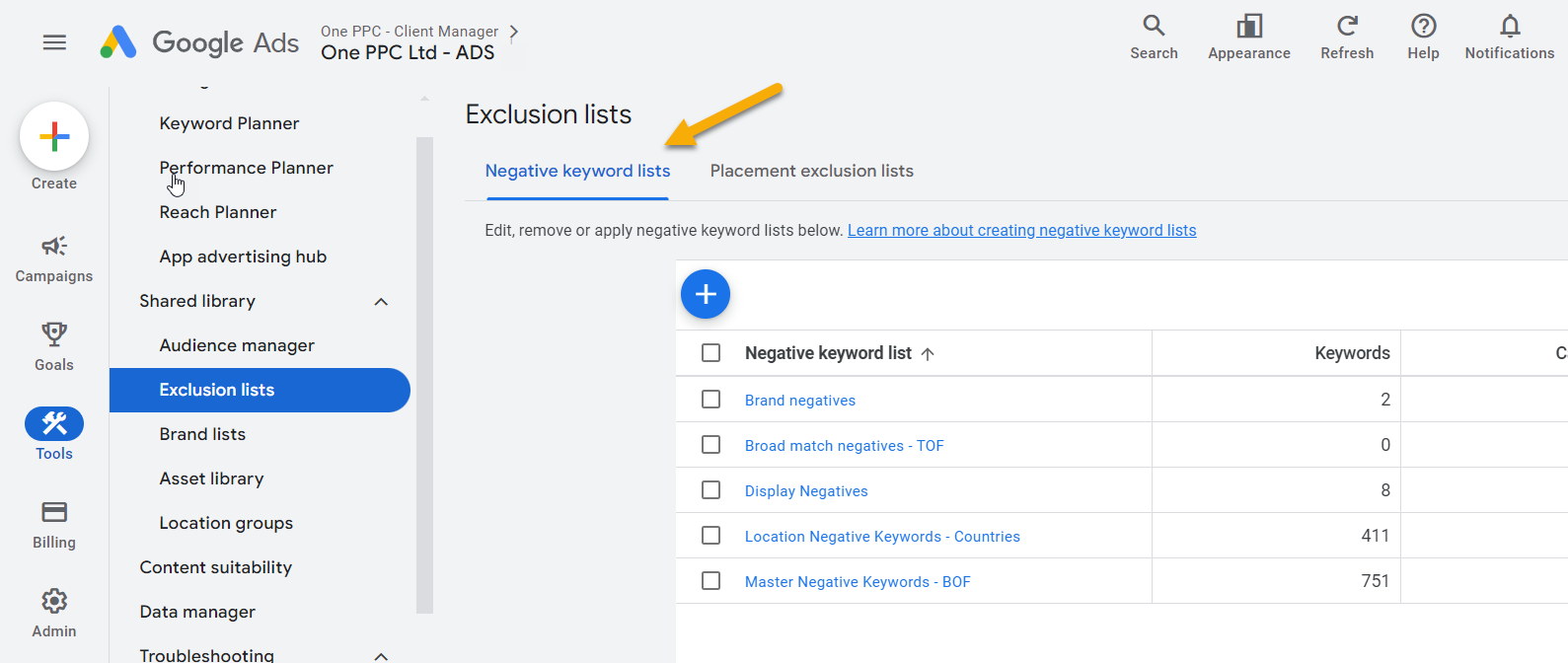
What is a Negative Keyword List?
A negative keyword list is a compilation of specific terms or phrases that you specify to exclude from triggering your online advertisements.
Negative keyword lists are commonly used in pay-per-click (PPC) advertising platforms, such as Google Ads or Microsoft Advertising. They can be implemented at various levels within the account structure, such as the campaign or ad group level, or as a shared list that can be used across multiple campaigns.
Implementing negative keywords at the campaign or ad group level allows you to customise the exclusions based on the specific targeting requirements of each campaign or ad group. This level of granularity ensures that your ads are not triggered by irrelevant searches within those specific campaign or ad group settings.
Additionally, utilising shared negative keyword lists enables you to apply consistent exclusions across multiple campaigns. This can be particularly useful when managing large-scale campaigns or when you want to maintain a unified approach to excluding irrelevant terms across various ad groups or campaigns within your account.
By leveraging negative keyword lists, you can streamline the management and optimisation of your PPC campaigns. It allows you to maintain better control over ad targeting, refine your audience reach, and improve the overall performance of your advertising efforts.
Remember to regularly review and update your negative keyword lists to align with your evolving business goals, target audience preferences, and changing market dynamics. Continuous refinement ensures that your PPC campaigns remain effective in excluding irrelevant searches and maximising the efficiency of your ad spend.
In summary, negative keyword lists are crucial tools in PPC advertising platforms, used at various levels of the account structure. Whether implemented at the campaign or ad group level or as shared lists, they enable you to refine ad targeting and exclude irrelevant searches, ultimately enhancing the performance and effectiveness of your PPC campaigns.
Creating a well-curated negative keyword list involves thorough research, analysis of search terms, and an understanding of your target audience. It is an ongoing process that requires regular monitoring and refinement to ensure its effectiveness and relevance over time. By continuously updating and optimising your negative keyword list, you can enhance the precision of your ad targeting, increase click-through rates, and improve the return on your advertising investment.
In summary, a negative keyword list is a valuable tool in PPC advertising that allows you to exclude specific keywords and prevent your ads from appearing in irrelevant searches. It helps you refine your ad targeting, optimise your budget, and improve the overall performance of your advertising campaigns.
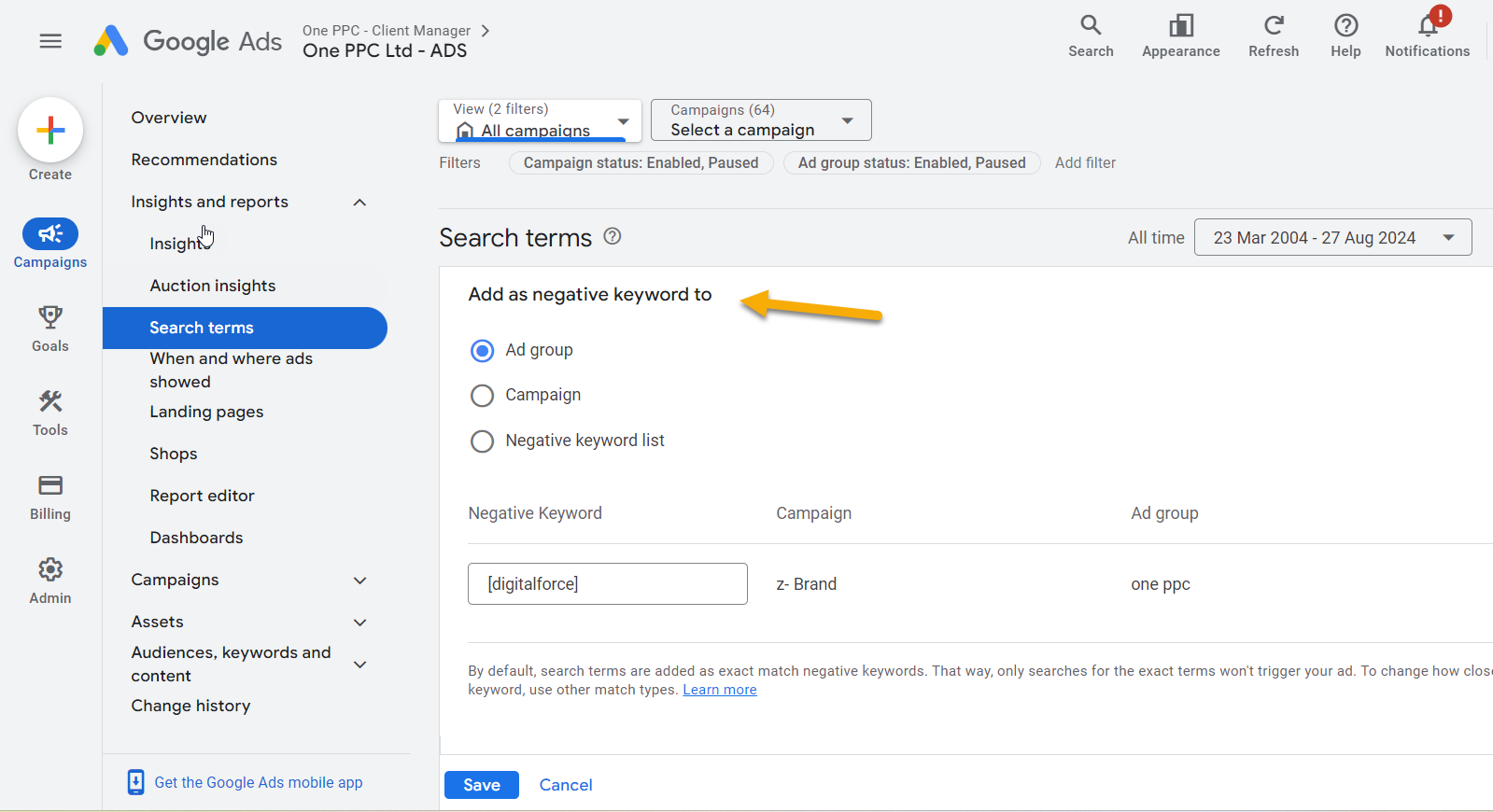
The Best Negative Keyword List
While the provided comprehensive keyword list offers valuable insights for various industries, it is important to remember that the relevance of these negative keywords can vary depending on your specific business and offerings. For some industries, all of these keywords may indeed be considered negative. However, it’s crucial to assess each keyword carefully to ensure its applicability to your particular industry and target audience.
For instance, if you provide training services, the keyword “training” would not be considered negative since it directly relates to your business. In this case, you may need to exclude specific subcategories or variations within the training industry that are irrelevant to your services. It’s essential to tailor the negative keyword list to your unique requirements and eliminate any terms that could potentially limit your exposure to relevant prospects.
By taking a proactive approach and carefully evaluating each keyword, you can create a refined negative keyword list that optimises your PPC campaigns and enhances your targeting precision. Regularly reviewing and updating your negative keyword list based on ongoing analysis of search query reports is crucial to ensuring its effectiveness and relevance over time.
So, while the provided comprehensive keyword list offers a strong foundation, it’s important to customise it to suit your specific industry and ensure that it aligns with your campaign goals. By tailoring the negative keyword list and continually monitoring its effectiveness, you’ll be well-equipped to drive PPC success and capture valuable traffic to propel your business forward.
Here are the most popular themes for negative keywords:
- Academic Training & Certification, Education & Schools
- Jobs & Careers, Informational
- Blog, Websites
- Legal
- DIY
- Medical & Health
- Product Materials
- Software
- Locations
- Used/Free
- Advertising & Media.
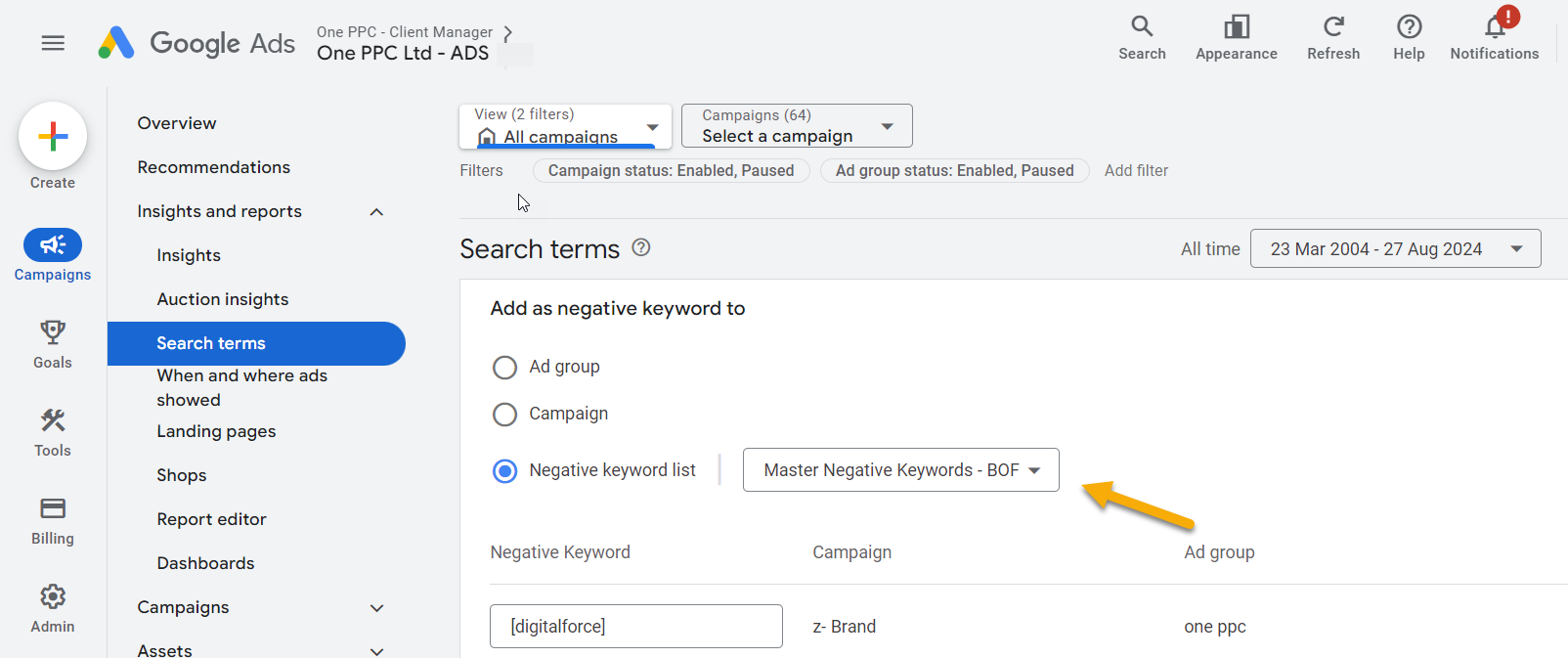
Academic, Certification, Training, Education, Schools & University
Unless you are involved in the educational space, these are some of the best negative keywords to start with.
about
admission
admissions
article
articles
association
associations
book
books
calculator
certification
certifications
class
classes
club
clubs
college
colleges
conference
conferences
council
councils
course
courses
degree
degrees
education
exam
exams
guide
guidebook
guidebooks
guides
institute
institutes
instruction
instructions
instructor
instructors
journal
journals
learn
learning
lesson
lessons
libraries
library
manual
manuals
program
programs
scholarship
school
schools
seminar
seminars
studies
study
teacher
teachers
test
tests
textbook
textbooks
train
trainee
trainer
training
tutor
tutorial
tutorials
tutors
uni
universities
university
white paper
white papers
workshop
workshops
Jobs & Employment
These are usually the best negative keywords to use for most industries. Stopping job seekers clicking on your adverts can be a big saver.
career
careers
employer
employers
employment
hire
hiring
intern
interns
internship
internships
interview
interviews
job
jobs
position
positions
recruiter
recruiters
recruiting
recruitment
resume
resumes
salaries
salary
staff
staffing
temps
vacancies
vacancy
wage
wages
Blog & Informational Search Terms
These words are typically associated with informational search terms, indicating that the search intent is primarily focused on gaining knowledge and finding answers to specific questions. Such keywords are often more suitable for organic targeting through blog content, where the goal is to grow awareness and provide informative resources to users.
However, when it comes to paid advertising, it is often advantageous to block or exclude informational searches. Instead, it is more effective to prioritise transactional searches that exhibit commercial intent or are closer to the purchasing stage in the buying funnel.
By focusing your paid advertising efforts on transactional searches, you can increase the likelihood of capturing potential customers who are actively seeking products or services and are more inclined to convert. Transactional searches often indicate higher intent and a greater readiness to make a purchase.
It’s important to recognise that the keywords associated with informational searches may still have value within your overall marketing strategy. By incorporating these keywords into your organic content, such as blog articles, you can attract and engage users who are in the research or learning phase of their buyer’s journey. This allows you to establish your brand as a trusted authority and nurture relationships with potential customers.
In summary, while targeting informational search terms through organic channels like blogs can be beneficial, paid advertising should typically focus on transactional searches to maximise conversions. By strategically aligning your paid ad campaigns with the appropriate keywords and search intent, you can optimise your budget and drive more impactful results in the form of increased click-through rates, conversions, and overall campaign success.
about
article
articles
blog
blogging
blogs
case studies
case study
check
checklists
checklist
define
definition
definitions
description
diagram
diagrams
example
examples
explain
explanation
fact
faq
forum
forums
history
history of
how
how to
idea
ideas
info
information
news
newsletter
pdf
policy
question
questions
quiz
recipe
recipes
technique
techniques
tip
tips
trick
tricks
types
types of
what
when
when can
where
which
why
wiki
write
writing
Websites
If you sell services, most of these websites are going to be irrelevant. For e-commerce check you search terms report to see performance before blocking.
amazon
amazon.com
craigslist
ebay
ebay uk
ebay.com
facebook
gumtree
instagram
kindle
linkedin
quora
twitter
Wikipedia
Legal
Unless you are actually selling legal related services or products, these should be good for you. Certainly for most industries.
act
law
laws
lawsuit
lawyer
lawyers
lease
legal
legislation
legislations
regulation
regulations
Photors & Images
Like blog/question keywords, these are very informational- and typically best to block within Google Ads – unless you explicitly provide these services or products.
gif
gifs
image of
images
jpeg
jpg
photo
photograph
photographs
photos
photoshop
pic
pic of
pics
picture
pictures
png
DIY
Unless you offer these type of products or services- add them to the negative keyword list.
craft
crafts
diy
do it yourself
hand made
handmade
homemade
make
making
Health & Medical
drug
drugs
hospital
medical
Materials
If you sell services product materials can be good negatives. Also if you sell products manufactured from certain materials, other materials can be blocked as negatives.
aluminum
ceramic
cotton
fabric
glass
gold
iron
leather
metal
paper
plastic
rubber
silver
stainless steel
steel
stone
vinyl
wood
Software
Unless you sell software, these negatives will be useful to most advertisers.
API
burn
burner
calculator
calculators
cd
cds
cms
code
codes
desktop
developer
developers
disk
download
downloadable
downloads
dvd
dvds
file
files
film
films
freeware
game
games
gnu
hack
hacks
javascript
licence
licences
license
login
map
microsoft
office
open source
php
platform
platforms
play
plugin
program
programs
saas
seo
shareware
shortcut
shortcuts
sign
SMS
software
template
templates
VPN
windows
Used & Free
fix
free
rent
rental
repair
repairs
secondhand
used
old
Locations
Google Ads allows targeting with an IP address. However, sometimes people within the target location will actually search for your services in another location. If you only sell to one city, then the other main cities in your country can be used as negative keywords.
canada
canadian
canadian made
india
indian
philippines
phillipines
phillipino
china
usa
France
Advertising & Media
adsense
advertisement
advertising
advice
affiliate
affiliates
animation
animations
magazine
magazines
movie
movies
mp3
msnbc
mtv
music
news
video
videos
Negative Keyword List Setup Instructions
Once a negative keyword list is created, attach to all the search campaigns that will use this.For tips on using negative keywords and how to build negative keyword lists, see our blog post Negative Keyword Guide & Tips.
It is good practice to run a keyword diagnostic on the positive keywords after updating negative keywords. This will identify if any negatives are conflicting with positive keywords. Google’s Help Centre also provide more information on negative keywords.
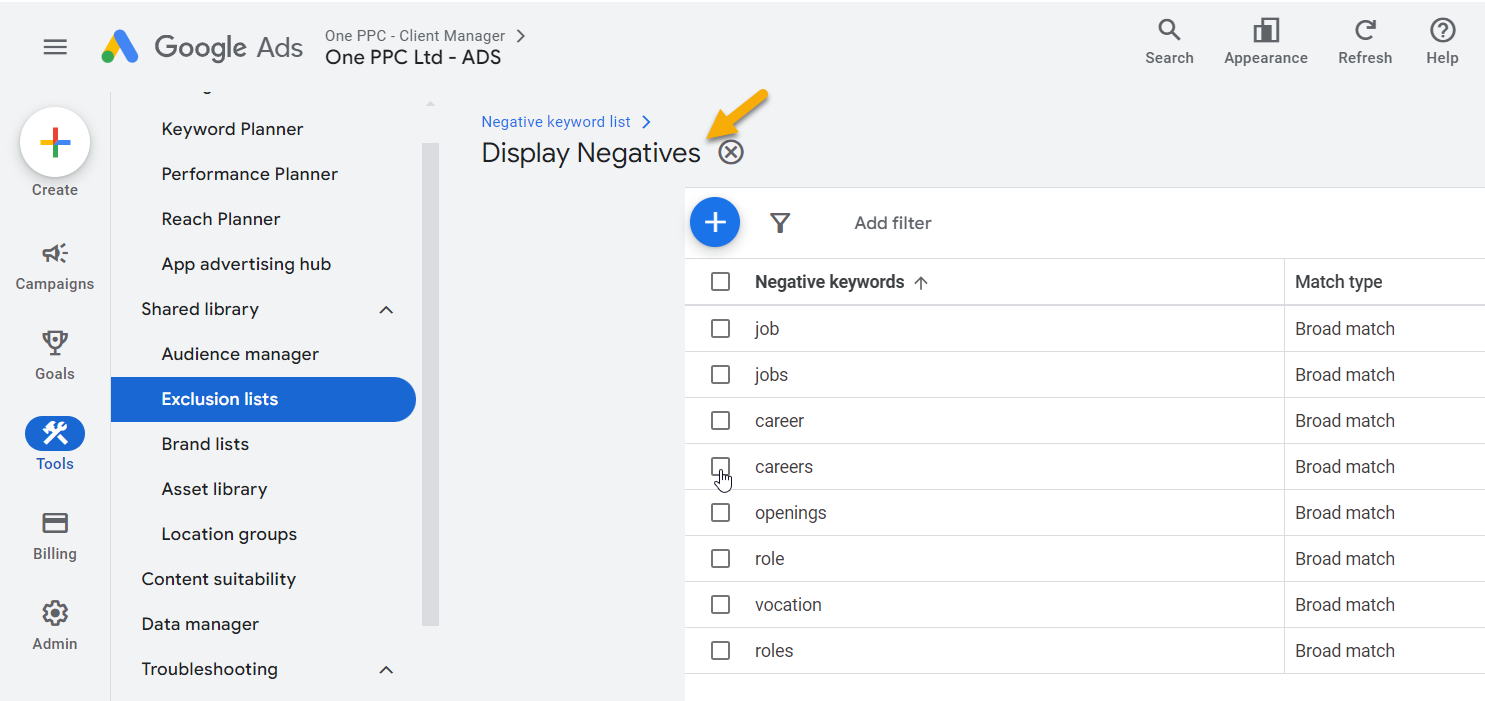
Total List of Keywords
This is one list of all of the keywords.
about
admission
admissions
article
articles
association
associations
book
books
calculator
certification
certifications
class
classes
club
clubs
college
colleges
conference
conferences
council
councils
course
courses
degree
degrees
education
exam
exams
guide
guidebook
guidebooks
guides
institute
institutes
instruction
instructions
instructor
instructors
journal
journals
learn
learning
lesson
lessons
libraries
library
manual
manuals
program
programs
scholarship
school
schools
seminar
seminars
studies
study
teacher
teachers
test
tests
textbook
textbooks
train
trainee
trainer
training
tutor
tutorial
tutorials
tutors
uni
universities
university
white paper
white papers
workshop
workshops
career
careers
employer
employers
employment
hire
hiring
intern
interns
internship
internships
interview
interviews
job
jobs
position
positions
recruiter
recruiters
recruiting
recruitment
resume
resumes
salaries
salary
staff
staffing
temps
vacancies
vacancy
wage
wages
about
article
articles
blog
blogging
blogs
case studies
case study
check
checklists
checklist
define
definition
definitions
description
diagram
diagrams
example
examples
explain
explanation
fact
faq
forum
forums
history
history of
how
how to
idea
ideas
info
information
news
newsletter
pdf
policy
question
questions
quiz
recipe
recipes
technique
techniques
tip
tips
trick
tricks
types
types of
what
when
when can
where
which
why
wiki
write
writing
amazon
amazon.com
craigslist
ebay
ebay uk
ebay.com
facebook
gumtree
instagram
kindle
linkedin
quora
twitter
Wikipedia
act
law
laws
lawsuit
lawyer
lawyers
lease
legal
legislation
legislations
regulation
regulations
gif
gifs
image of
images
jpeg
jpg
photo
photograph
photographs
photos
photoshop
pic
pic of
pics
picture
pictures
png
craft
crafts
diy
do it yourself
hand made
handmade
homemade
make
making
drug
drugs
hospital
medical
aluminum
ceramic
cotton
fabric
glass
gold
iron
leather
metal
paper
plastic
rubber
silver
stainless steel
steel
stone
vinyl
wood
API
burn
burner
calculator
calculators
cd
cds
cms
code
codes
desktop
developer
developers
disk
download
downloadable
downloads
dvd
dvds
file
files
film
films
freeware
game
games
gnu
hack
hacks
javascript
licence
licences
license
login
map
microsoft
office
open source
php
platform
platforms
play
plugin
program
programs
saas
seo
shareware
shortcut
shortcuts
sign
SMS
software
template
templates
VPN
windows
fix
free
rent
rental
repair
repairs
secondhand
used
old
canada
canadian
canadian made
india
indian
philippines
phillipines
phillipino
china
usa
France
adsense
advertisement
advertising
advice
affiliate
affiliates
animation
animations
magazine
magazines
movie
movies
mp3
msnbc
mtv
music
news
video
videos
Conclusion
Understanding popular negative keywords can help you save money by taking a proactive approach rather than relying solely on the search terms report after costs have already been incurred. When setting up a new Google Ads account, incorporating these popular negative keywords allows you to learn from past accounts and apply valuable insights from the start. To optimise their effectiveness, it’s important to use negative keyword match types, including both single-word and multiple-word negatives.
Creating a well-thought-out negative keyword list is an essential step in optimising your PPC campaigns. By preventing your ads from appearing in irrelevant searches, you’ll significantly improve ad targeting, increase click-through rates, and make the most out of your budget. Utilise the suggestions provided in this blog post to build a robust negative keyword list that aligns with your campaign goals. Be sure to regularly review and update your list to ensure its continued effectiveness, and continuously monitor search query reports for new negative keyword opportunities.
By adopting a strategic approach to negative keywords, you’ll be on the path to achieving PPC success and driving valuable traffic to your website. With optimised ad targeting, improved click-through rates, and a maximised budget efficiency, you can expect to see enhanced results and a higher return on investment. Embrace the power of negative keywords and watch your PPC campaigns thrive.